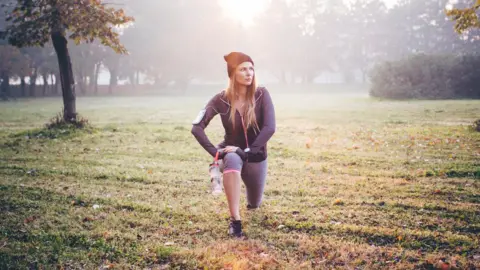Covid-19: 'Less exercise and more TV' than first lockdown
 Getty Images
Getty ImagesTwo-fifths of people say they are doing less exercise in this lockdown than during the first one in spring 2020, a large UK survey suggests.
About a fifth of people say they are watching more TV, streaming more films and gaming more.
Meanwhile a third of respondents are working more, but volunteering and time spent on hobbies has decreased.
Scientists suggest people have found this period tougher and are more focused on coping with their lives.
'Novelty wearing thin'
Lead researcher, Dr Daisy Fancourt, from University College London, said: "It is not surprising that the current lockdown has seen fewer people exercising than the first, taking place as it does during the winter months.
"But this is still a cause for concern, as exercise can boost not just physical, but also mental, wellbeing.
"The reduction in time spent on hobbies and volunteering can partially be explained by the increased time spent working," she added.
"It also hints that the novelty of increased free time that came with the first lockdown has worn thin among much of the population, with many turning towards television and gaming to fill their time."
The study, conducted by University College London, and funded by the Nuffield Foundation think tank, has followed 70,000 people for more than 40 weeks.
Participants were asked how they spent their past week, and to compare this to how they spent their time in the first lockdown.
- 40% reported doing less exercise, while 13% said they exercised more
- 36% reported reduced involvement with arts and crafts, compared with 11% who said they did more of this
- 30% said they were less engaged with their hobbies, including gardening and DIY
- 36% reported spending less time volunteering, with only 13% saying they were volunteering more
- 19% said they watched more TV or streamed more films, compared with 13% who reported watching less TV
Researchers say the overall trends suggest the levels of satisfaction with life has deteriorated in recent weeks.
Cheryl Lloyd, at the Nuffield Foundation, said some groups of people, including women and those on lower incomes, were more at risk from the mental health impacts of lockdowns.
She added: "With lockdown set to continue for the foreseeable future, it is crucial that efforts are made to ensure people know how to access mental health support, and that this support is available to those who need it."
 Getty Images
Getty ImagesThe government acknowledged last year had been "exceptionally challenging", and had impacted on many people's mental health.
A spokesperson said: "Mental health services have remained open during the pandemic, and the recently-launched Every Mind Matters campaign raises awareness of the guidance and support available to those who need it."
Meanwhile Rosie Weatherley, at the charity Mind, said the organisation's own surveys had shown people's mental health had worsened during the first lockdown, with some people developing problems for the first time.
She added: "If you notice changes to your feelings, thoughts and behaviours that last longer than two weeks, keep returning or are having an impact on your daily life, talk to your GP who can help outline the support that's available."
Participants in the ongoing study by University College London were recruited through adverts and social media posts, as well as from organisations representing a range of communities.